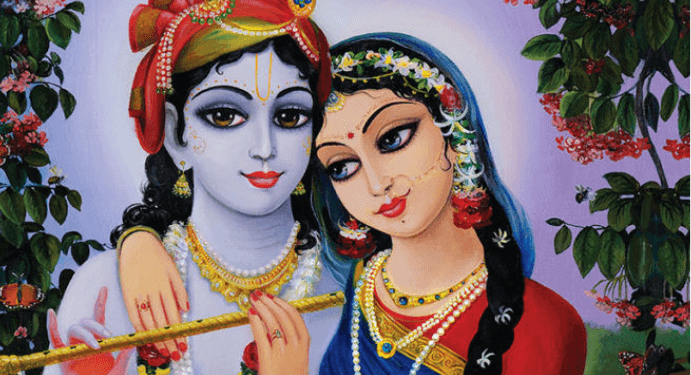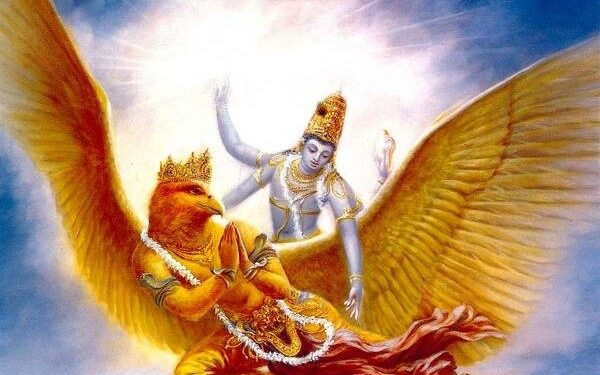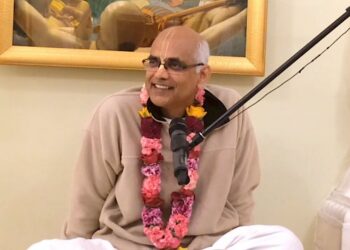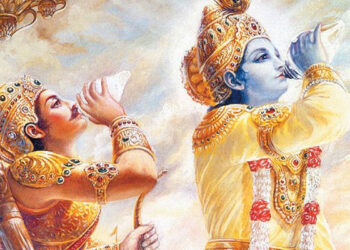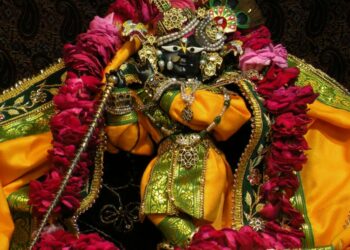After this incident, Vasudeva asked his family priest, Garga Muni, to visit the place of Nanda Mahārāja in order to astrologically calculate the future life of Kṛṣṇa. Garga Muni was a great saintly sage who had undergone many austerities and penances and been appointed priest of the Yadu dynasty. When Garga Muni arrived at the home of Nanda Mahārāja, Nanda Mahārāja was very much pleased to see him and immediately stood up with folded hands and offered his respectful obeisances. He received Garga Muni with the feeling of one who is worshiping the Supreme Personality of Godhead. He offered him a nice sitting place, and when he sat down, Nanda Mahārāja offered him a warm reception. Addressing him very politely, he said, “My dear brāhmaṇa, your appearance in a householder’s place is only to enlighten. We are always engaged in household duties and are forgetting our real duty of self-realization. Your coming to our house is to give us some enlightenment about spiritual life. You have no other purpose in visiting householders.” Actually, a saintly person or a brāhmaṇa has no business visiting householders, who are always busy in the matter of dollars and cents. The only reason saintly persons and brāhmaṇas go to the place of a householder is to enlighten him. If it is asked, “Why don’t the householders go to a saintly person or a brāhmaṇa for enlightenment?” the answer is that householders are very poor-hearted. Generally householders think that engaging in family affairs is their prime duty and that self-realization or enlightenment in spiritual knowledge is secondary. Out of compassion only, saintly persons and brāhmaṇas go to householders’ homes.
Nanda Mahārāja addressed Garga Muni as one of the great authorities in astrological science. The foretellings of astrological science, such as the occurrence of solar or lunar eclipses, are wonderful calculations, and by this particular science a person can understand the future very clearly. Garga Muni was proficient in this knowledge. By this knowledge one can understand what his previous activities were that are causing him to enjoy or suffer in this life.
Nanda Mahārāja also addressed Garga Muni as “the best of the brāhmaṇas.” A brāhmaṇa is one who is expert in the knowledge of the Supreme. Without knowledge of the Supreme Absolute, one cannot be recognized as a brāhmaṇa. The exact word used in this connection is brahma-vidām, which means those who know the Supreme very well. An expert brāhmaṇa is able to give reformatory facilities to the subcastes—namely the kṣatriyas and vaiśyas. The śūdras observe no reformatory performances. The brāhmaṇa is considered to be the spiritual master or priest for the kṣatriya and vaiśya. Nanda Mahārāja happened to be a vaiśya, and he accepted Garga Muni as a first-class brāhmaṇa. He therefore offered his two foster sons—namely Kṛṣṇa and Balarāma—to him to purify. Nanda stated that not only these boys but all human beings just after birth should accept a qualified brāhmaṇa as spiritual master.


